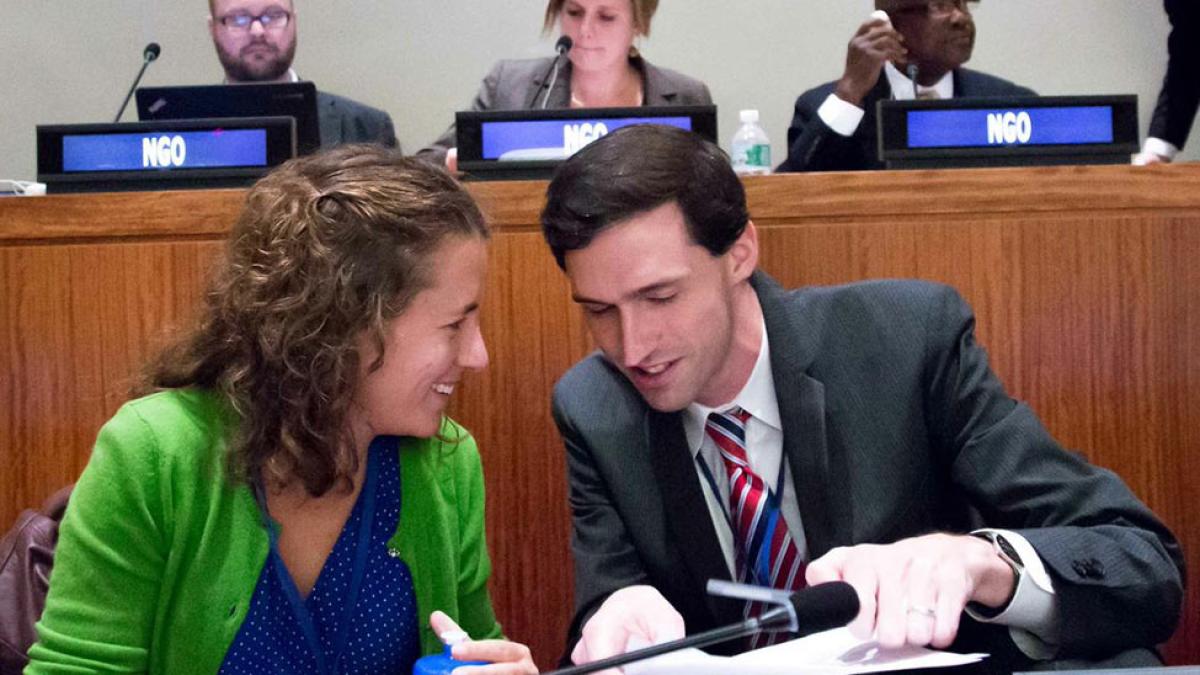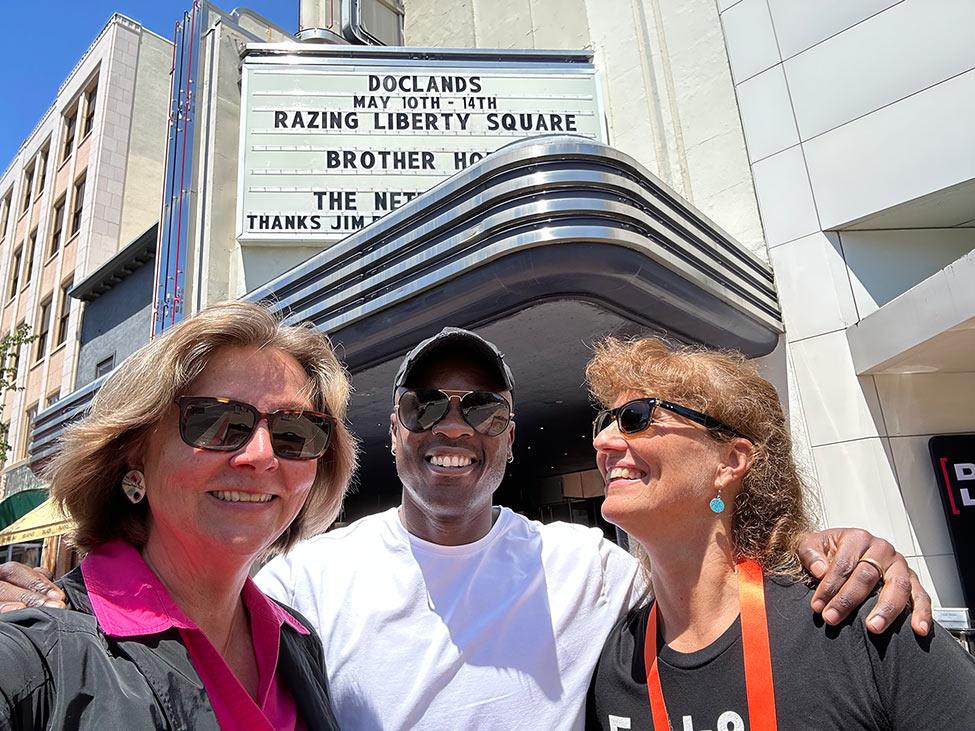
Raising Questions about Razing Liberty Square
Razing Liberty Square unveils the untold story of Miami's Liberty City and the impact of climate gentrification. Professor Corinna Sager shares her journey of producing this groundbreaking documentary, how she integrated the experience into her classes, and why she believes in the power of asking questions.


Corinna Sager is a producer, speaker, and educator. She’s produced everything from international events to feature films and has been teaching at Pace since the introduction of Dyson’s Media Communications and Visual Arts program in 2010.

And for the past four years, she’s worked as a producer on a groundbreaking documentary about how climate gentrification is affecting a historically Black public housing project in Miami, Florida. After years of filming, editing, and fighting to ensure the story was told, the feature-length documentary Razing Liberty Square premiered on PBS on January 29, 2024.
Her experience on Razing Liberty Square, as a producer in general, and as an educator all follow a common theme: Ask questions.
“I always ask questions, I'm always curious,” Sager says.
Her curiosity was certainly piqued when her close friend and frequent collaborator Katja Esson reached out to ask for help on this Miami-based project. Both Sager and Esson hail from and met in Hamburg, Germany, and both have lived in Miami. Ironically, Esson moved to Miami at Sager’s suggestion, who attended the University of Miami and thought it would be a great fit for Esson’s film and theater aspirations.
I always ask questions, I'm always curious.
Esson learned about the plans to raze and rebuild Liberty Square in 2017 and soon picked her camera to follow the process. “You know, as a European, we always think ‘why is America constantly tearing things down?’” Sager explains. But Esson had no idea just how complicated the story was about to get as she began filming.
Liberty Square is an area of public housing in the Miami neighborhood Liberty City. It’s the first public housing project of its kind in the American South and for years was separated by a wall, physically segregating the predominantly Black community from the surrounding areas. Integration triggered a “white flight” from the surrounding area by anti-integration white citizens, and Miami began to invest less in the Liberty City area as a whole. This, coupled with the development of more public housing nearby, caused Liberty City, and especially Liberty Square, to become an area of concentrated poverty and crime.
In recent years, the city of Miami took an interest in Liberty Square. The urban development company Related Urban unveiled plans to revitalize the area, bringing in national chains, community centers, and brand new residences to create a mixed-income community.
The cause for the sudden interest in reinvesting in this neglected neighborhood? Climate change. Liberty City sits on a ridge 12 feet above sea level. As such, it is not subjected to the same amount of flooding and natural disasters as other parts of Miami. It’s now prime real estate.
Related Urban promised the residents of Liberty Square they would not be displaced, and that impact would be minimal. Some residents of Liberty Square were excited for the chance to live in brand new spaces in an up-and-coming neighborhood. But many others expressed suspicion and skepticism; they had lived through past revitalization projects in which similar promises were made and broken.
As a producer, you have to know and understand everything.
As Katja Esson documented these stories, each new layer brought more questions. What is climate gentrification? Could the development company be telling the truth? Would this usher in a new era of prosperity for the residents of Liberty Square? Or would this be a case of history repeating itself?
As the story became more complex by the day, Esson reached out to Sager to see if she would be interested in lending a hand as another producer. Sager joined the production in January 2020.
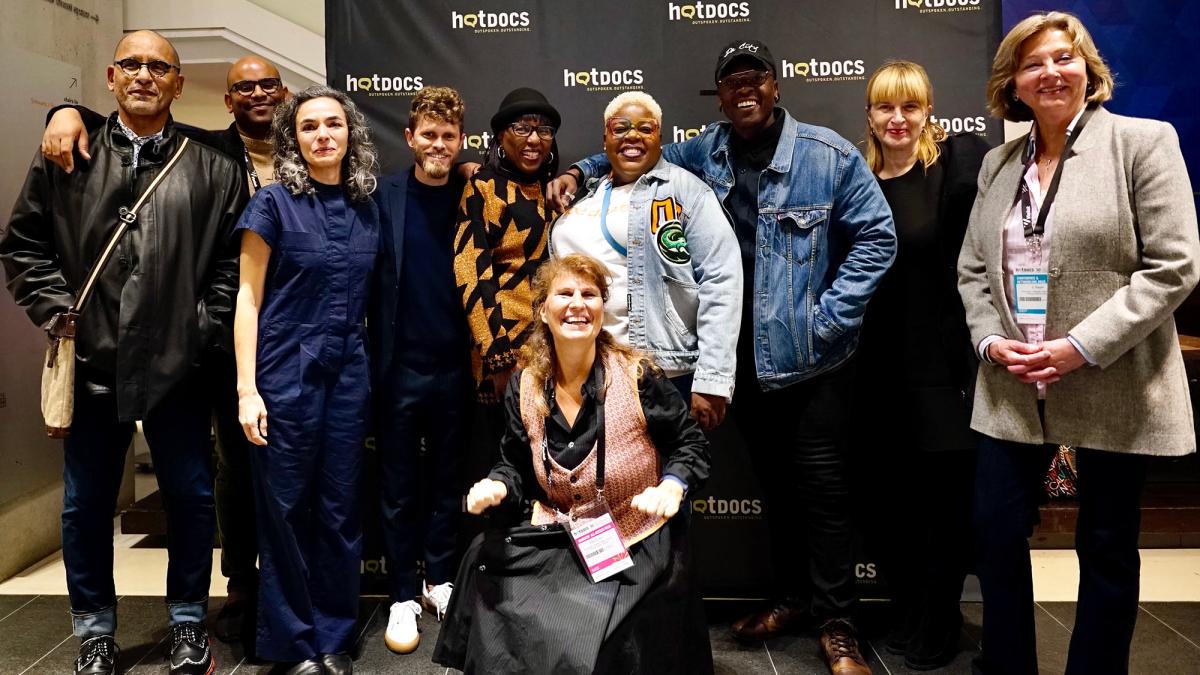
“It was a lot of learning,” Sager explains. “We were dealing with gentrification, with people being moved out, with Section 8 housing vouchers.” Not to mention the stress that the looming pandemic would put not only on the unfolding situation, but production itself.
They were also chasing questions. Not just their own, but the questions from the people they were following. What was Related Urban actually promising? Were these options actually just another form of displacement? “We had to edit for almost three years, because we were really trying to figure out a way to make these different subject matters intersect and make people get it.”
And throughout all of this, Sager was teaching at Pace.
During the final stretch of post-production for Razing Liberty Square, Sager was teaching her class Producing: Script to Schedule, and she was able to bring in everything she was experiencing to her students. “That part was easy, because I was living it,” she said. “My goal is always to treat my students like young professionals, and not like students.”
My goal is always to treat my students like young professionals, and not like students.
Sager invited Esson and others involved in the project, as well as other colleagues, to speak with her class and share their expertise. Students received a more holistic perspective as they learned from directors, post-production professionals, editors, and more who could speak to different aspects of production. “As a producer, you have to know and understand everything,” Sager explains. “You need to understand your team when they say something. If you don’t, you have to ask questions.”
These students, who were preparing a pitch of their own project for finals, were also able to review some of the professional pitches Sager and the Razing Liberty Square producers submitted to entities such as the Sundance Institute and PBS. Students could follow along and see how the approach changed over time, how it was adapted for different stakeholders, and how their pitches evolved with the project.
“Every production is a learning process,” Sager explains. “You have to be open to learning, you have to be open to asking questions. And you have to never be afraid to ask questions. You do not look stupid. On the contrary, if you ask questions, it shows that you're interested. It shows that you want to learn, and you really want to get an understanding.”
It’s not just about asking questions and being willing to learn, it’s also about excellent communications skills.
But just like with Razing Liberty Square, asking questions is just the beginning.
“It’s not just about asking questions and being willing to learn, it’s also about excellent communications skills,” Sager says. Across all of her classes—from public speaking to international communications to producing—Sager impresses upon her students the importance of learning to communicate effectively to work as a team and bring understanding.
Razing Liberty Square serves as perfect evidence of these principles. It began with a question: what is happening to Liberty Square? After years of filming, navigating competing interests, and delving into complex, multi-layered issues, curiosity was only the starting point. It took the ability to work across competing interests, nuanced storylines, and multi-faceted issues to bring the story to life.
Answer the question of what becomes Liberty Square in the new documentary, Razing Liberty Square on PBS or streaming online.
A Brief Legal History of Wisconsin Conservation
Pace | Haub Environmental Law Professor Jason Czarnezki's article "A Brief Legal History of Wisconsin Conservation,” co-authored with 3L Carolyn Drell, was published in the Marquette Law Review. The article examines the legal history of Wisconsin conservation — how the state’s conservation values were expressed in law, how its natural resources law has evolved and what that has (and has not) embodied, and how Wisconsin helps us define modern concepts of “conservation.”
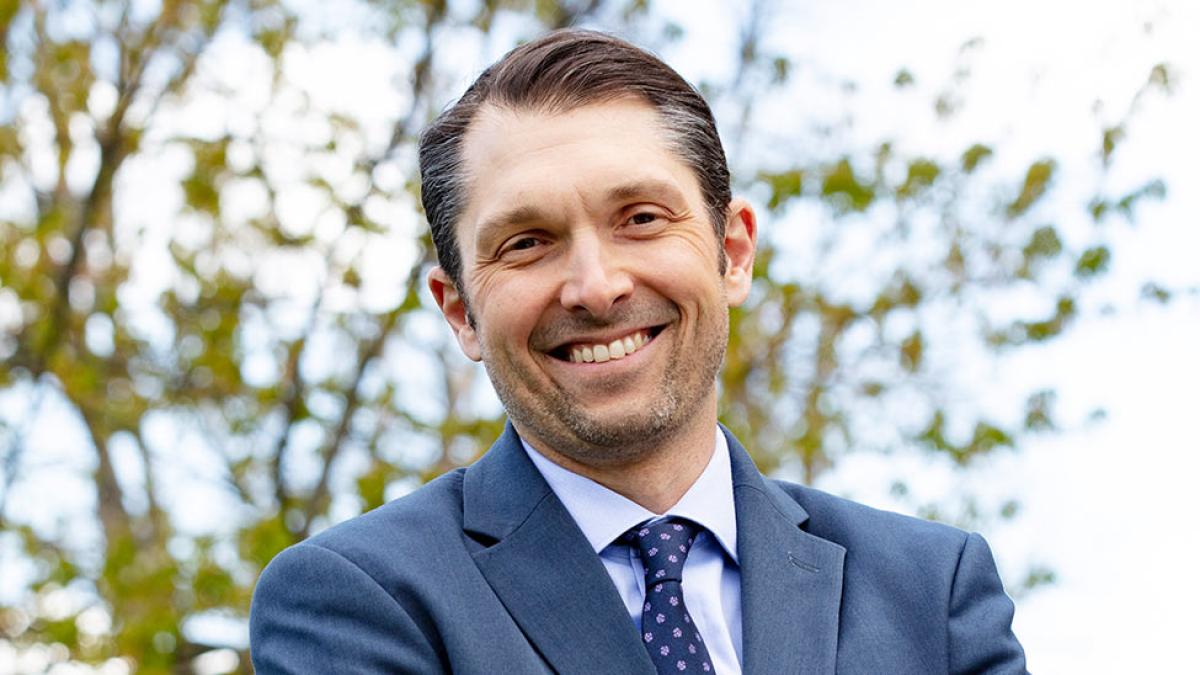
Pace | Haub Environmental Law Professor Jason Czarnezki's article "A Brief Legal History of Wisconsin Conservation,” co-authored with 3L Carolyn Drell, was published in the Marquette Law Review. The article examines the legal history of Wisconsin conservation — how the state’s conservation values were expressed in law, how its natural resources law has evolved and what that has (and has not) embodied, and how Wisconsin helps us define modern concepts of “conservation.”
Born and raised in Wisconsin, Professor Czarnezki recounts his own childhood interest in environmental issues sharing the early visionary work of Gerald Czarnezki (Grandpa Gerry), who was, at the time, considered something of a radical conservationist, as well as the work of his father Joe Czarnezki, who drafted and sponsored significant environmental legislation while serving in the Wisconsin State Senate and Assembly.
Hands-On Humanities: Experiential Learning in Unexpected Places
In the Dyson College of Arts and Sciences, hands-on learning isn’t reserved solely for the science labs and art studios. Pace’s experiential approach to the humanities builds on the University’s long-standing commitment to undergraduate research and civic engagement.
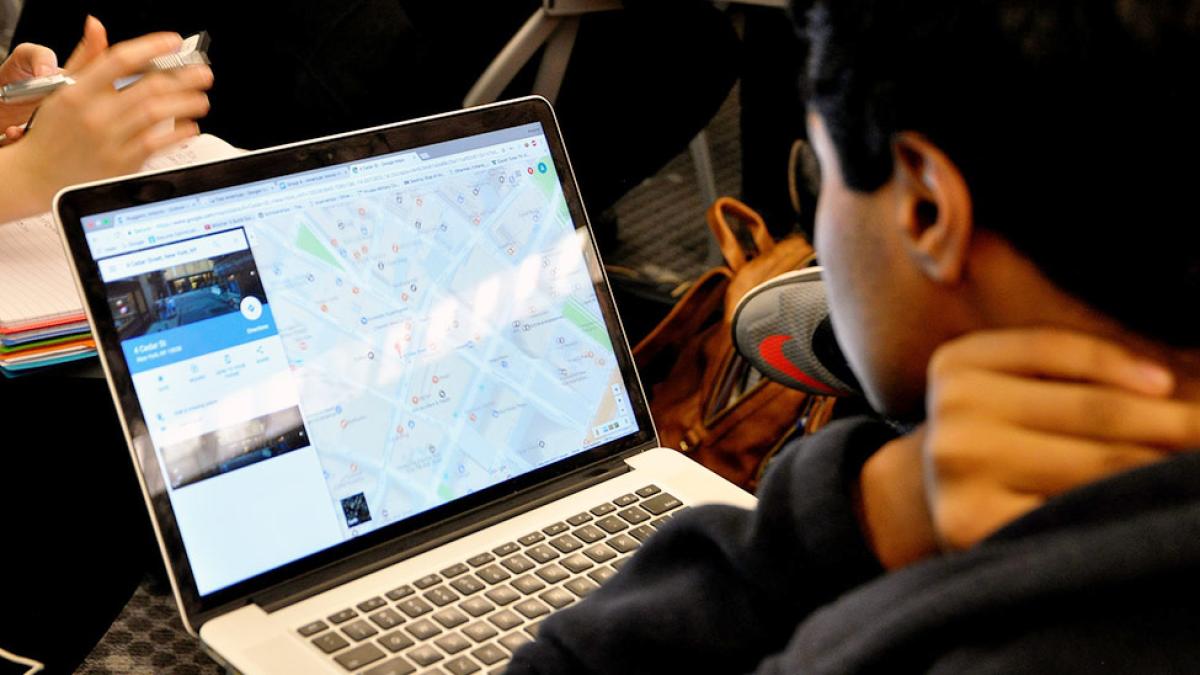
Thinking about studying the humanities may conjure images of dusty textbooks and snoozy lectures. In the Dyson College of Arts and Sciences, however, hands-on learning isn’t reserved solely for the science labs and art studios. In fact, Pace’s experiential approach to the humanities, particularly in the English department, has garnered national attention in media outlets such as The New Yorker, Inside Higher Ed, and The Chronicle of Higher Ed.
The experiential humanities at Pace build on the University's longstanding commitment to undergraduate research and civic engagement, as well as on recent initiatives in the digital humanities, public humanities, community-engaged art, and antiracist education. It is an approach designed to empower students to explore and participate in the production of knowledge about the past and present; to make sense of the history and current lived experiences of racism, sexism, and economic inequality; and to blaze new pathways for achieving social justice and creating a better world.
“The humanities have been undergoing a transformation for some time now that is about questioning who are we studying when we're studying the humanities or who are the humanities really for?” said Associate Professor of English Kelley Kreitz, PhD, Pace’s newly appointed director of experiential learning and the Pace Path. “To do that, you need to rethink how knowledge is produced in the first place and who is producing knowledge. And suddenly the experiential part of the humanities becomes not only something that makes sense, it becomes necessary.”
In addition, Pace University was recently awarded a total of $350,000 through a pair of grants from the National Endowment of the Humanities (NEH) that will help cement Pace as a hub for the humanities through new projects, community partnerships, and instructional spaces.
Take a look at a few of many examples of how the humanities are coming to life at Dyson.
AMS 333 Chinatowns in the Americas (NYC campus)
Associate Professor of English Stephanie Hsu, PhD, designed the Chinatowns in the Americas course as one of Pace’s designated civic engagement courses as a form of resistance to the anti-Asian racism—particularly in the wake of the COVID-19 pandemic—that’s been directed at Chinatowns, including the neighborhood adjacent to Pace’s downtown campus.
“For us in this course, experiential learning revolves around another key concept: mutual aid,” said Hsu, “which means that we’re listening to our community partners (cultural and social services nonprofits in Chinatown) and trying to meet the actual needs they describe by using our skills and resources in new and innovative ways that benefit and improve us, too, as individuals and as an institution.”
Through the course, Pace students are connecting directly with community members to learn about the political developments and quality of life issues facing Manhattan’s Chinatown, including real estate development, eminent domain land seizures, the city’s plans to build a “mega-jail,” and food insecurity driven by high food prices.
CMS 309 Girls’ Media Studies: Theory and Research (NYC campus)
In spring 2023, students in the Girls’ Media Studies course, taught by Professor of Communication and Media Studies Emilie Zaslow, PhD, partnered with the online Girl Museum to create an exhibit in the museum’s first student-led collaboration. As part of this initiative, each student first conducted research on the topic of girlhood and media between 1910-1960, and then selected a toy advertisement that targeted girls or advertised toys intended for girls during this era. In addition, a museum educator from the Girl Museum visited the class virtually and presented a session on writing and interpretation for virtual museum audiences, after which, each student expanded their research, wrote an analysis, and engaged in peer reviews.

Ari Cardenas ’23, Communication and Media Studies, selected an advertisement for the “Tiny Tears” doll, whose marketed feature was its ability to cry “real” tears. Researching the manufacturer, the American Character Doll Company, Cardenas gained an understanding of the era when the toy was made as context for examining the language of the advertisement and the purpose of the toy, which is to prepare young girls for motherhood through a doll that mimics an actual baby.
“I found it really interesting to explore this cross-examination of the ingrained gender roles and the role that our media plays in socializing us at an incredibly young age,” said Cardenas. “I hope that this opens people’s eyes and allows people to think a bit differently as to how they are contributing to perpetuating gender roles or how today’s media does it as well.”
ENG 223A: Creating a Good Life (Westchester campus)
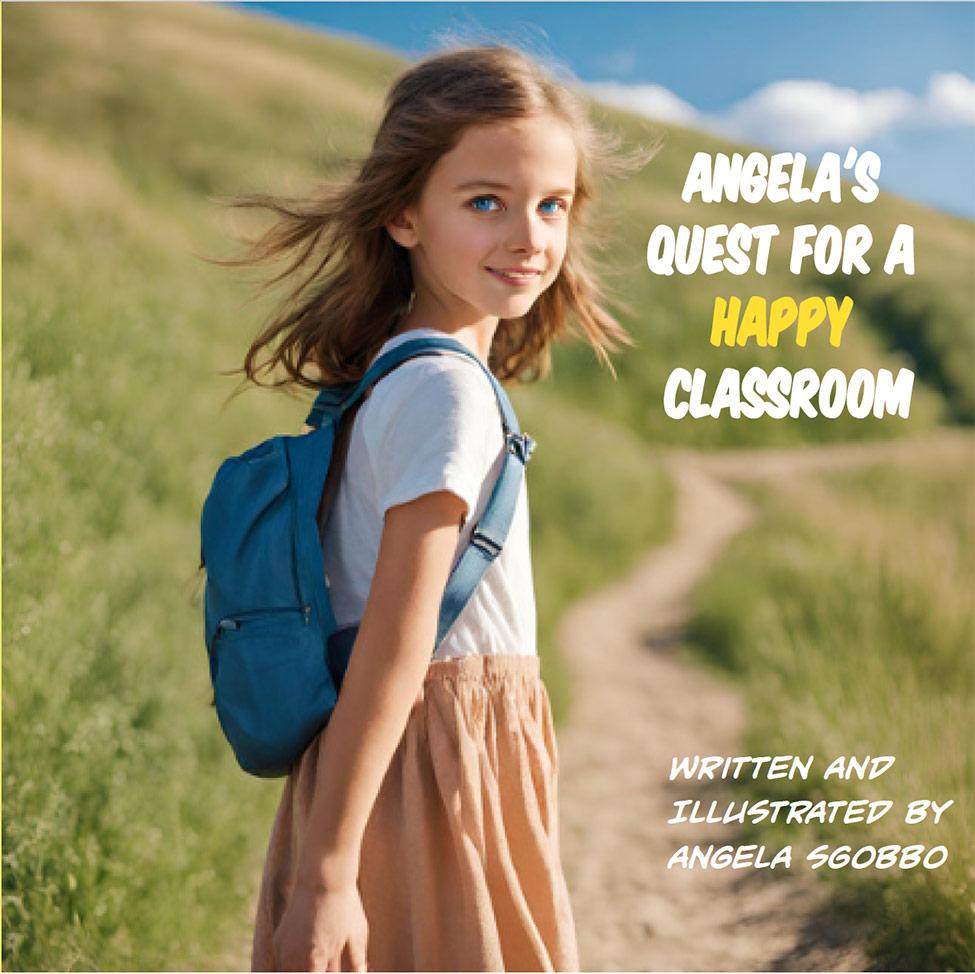
Taught by Lecturer of Writing and Cultural Studies Alysa Hantgan, MFA, Creating a Good Life “explores the intersection of research on creativity, productivity, success, and happiness.” Students in the course explore the existing body of happiness research and begin to incorporate strategies discussed in the research—such as practicing meditation, engaging in new activities with friends, participating in aerobic exercise, and writing gratitude cards—into their own lives to explore their impact on happiness.
“Through interactive means and creative experiences, each student focused on specific gauges of their life (work, play, love, and health) and narrowed in on the few that could be improved,” said Lydia O’Briskie ’25, Early Childhood Education (School of Education). “The material of this course led me to visualize the improvement of my gauges, as I was focusing on love and health. As a result of my research and investigation, I learned to appreciate those that I love and to show gratitude, in addition to taking better care of my body and mental health.”
Upon conducting this experiential “me” search, students employ creative writing to share their findings on their new understanding of what makes a “good life.” Angela Sgobbo ’25, Early Childhood Education, chose to present her work through the creation of a children’s book.
“This dynamic presentation not only added a layer of creativity to the autoethnography, but also allowed for a more immersive exploration of my struggles, triumphs, and the broader cultural implications of my pursuit of a good life,” said Sgobbo. “Through this innovative approach, I sought to resonate with the themes of the class while maintaining the integrity of autoethnographic research.”
ENG 322A: The Art of the Memoir (Westchester campus)
In The Art of the Memoir, Assistant Professor of Writing and Cultural Studies Vyshali Manivannan, PhD, employs strategies, such as body scanning and body mapping, to help inform and deepen students’ writing about their own lives. Body scanning is a meditative practice that helps students bring awareness to physical sensations and emotional states, as well as the connection between them. Body mapping is an art form in which students use body diagrams to locate and record these sensations.
“A short trauma-informed body scanning session can effectively and safely reconnect writers with immediate sensation; a brief trauma-informed body mapping exercise can help writers develop somatically-located and -focused narratives of lived experience from those sensations,” said Manivannan.
“This class focused on embodiment and writing about embodied experiences,” said Hannah Mills ’26, Writing and Cultural Studies. “The mindfulness techniques that we practiced in class and that were interworked within my drafting process have been very meaningful to develop. These strategies have impacted the way I approach writing about my life experiences and connecting with myself and my writing.”
Manivannan, who also employs yoga practices and gamification techniques in many of her classes, noted that students have delivered their memoir project in a variety of forms, including Canva infographics, interactive websites, and audiovisual projects.
HIS 196H COVID-19 and Black Lives Matter: Comparative, Crisis-based Oral History in the American Experience (NYC campus)
In HIS 196H, a designated civic engagement course taught by Clinical Associate Professor of History and Assistant Provost for Research Maria Iacullo-Bird, PhD, students conduct and interpret oral history interviews surrounding the COVID-19 crisis and Black Lives Matter movement in America. Students are trained as oral historians, focusing on the Pace University and Lower Manhattan communities, to gain a deeper understanding of the intersection of infectious disease and social justice.
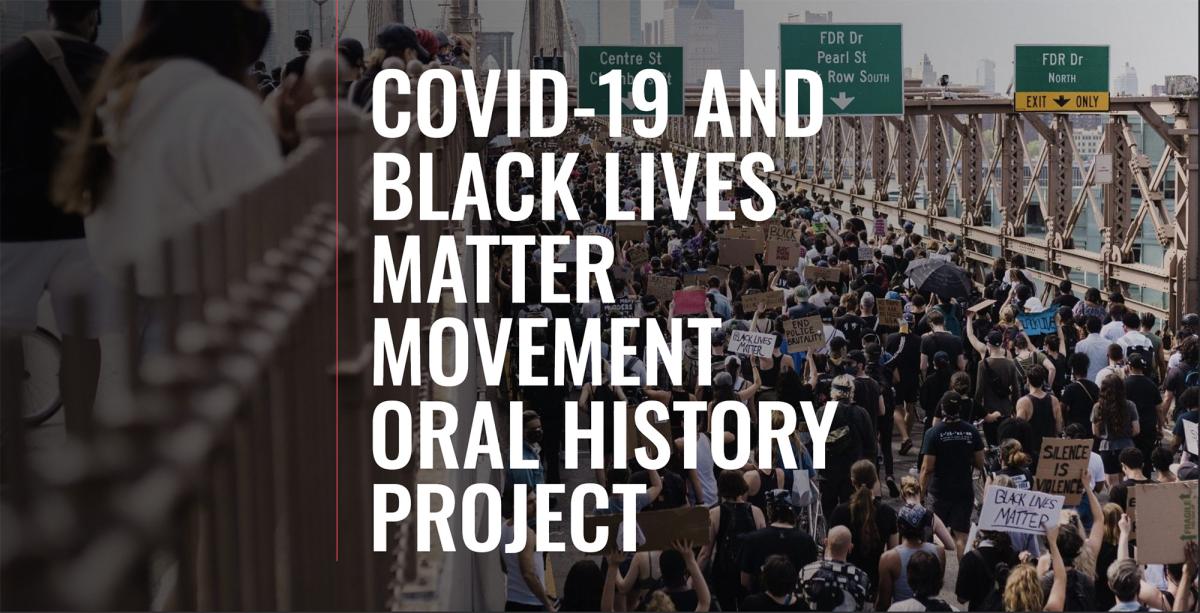
“Oral history allowed me to understand both COVID-19 and the Black Lives Matter movement from individual perspectives,” said Madison Turunen ’23, History and Peace and Justice Studies. “Much of my understanding came from the media, my inherent biases and beliefs, and my circle of friends and family. With the interviews, I was able to learn from the experiences I did not interact with: healthcare professionals and community organizers. It is one thing to read statistics and reports, it is a complete other to hear first-hand experiences."

The goal of this course is also to create a digital archive centered on these concurrent crises. The video recordings and transcripts of the oral history interviews are compiled on a blog site, allowing public access to the students’ findings. Students in the course have also presented their work as part of Pace’s annual Social Justice Week.
LIT 211U Latina/o Voices: Transnational Currents in American Writing (NYC campus)
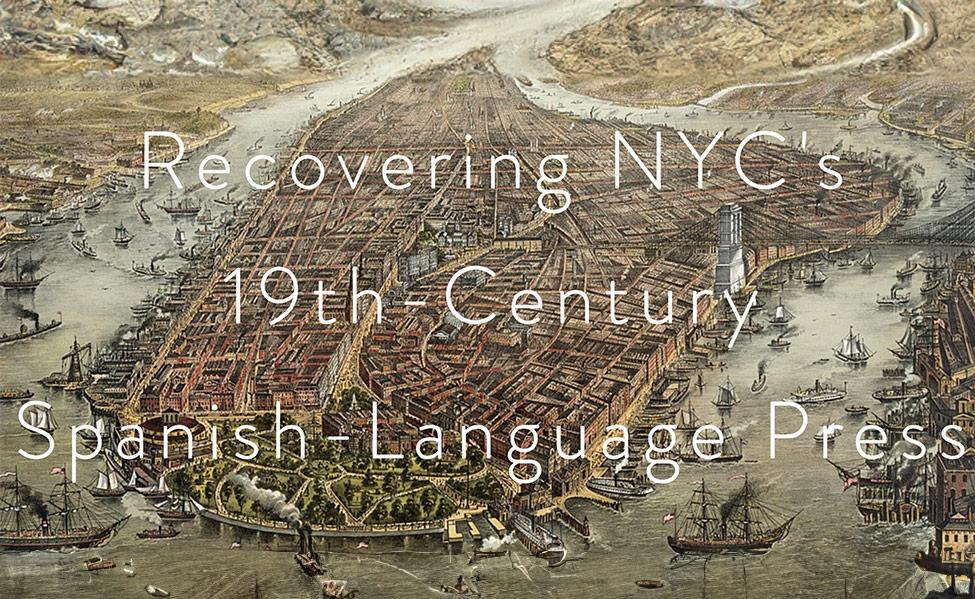
In Kreitz’s introductory Latinx literature course, the class explores the Spanish-language publishing that began in the 19th century in the neighborhood surrounding what is now Pace’s downtown Manhattan campus. Kreitz noted that, because this is an understudied area of publishing, it can be a challenging topic to teach.
“It becomes necessary to engage students in recognizing where the gaps in the archive are and why they happened in the first place,” said Kreitz, who has also received funding from the National Endowment for the Humanities for her work.
The class participates in a series of assignments where students create a digital map, often after visiting significant locations in the neighborhood, researching sites of 19th century Spanish language press. The goal, then, is for students to not only to recognize the vibrant community that existed right in their backyard, but also to be a part of making that history visible.
“We don’t really understand the lives, hopes, and struggles of those publishing in the Spanish language until we make a dedicated effort to study it,” said El Aparacio ’25, English Language and Literature, who took the course. “This project pinpoints the locations of these impactful newspapers and brings them into focus. We find the when and where of Spanish language press, then we’re able to further contextualize their importance—the why. Above all, it really made me appreciate the people dedicated to preserving this part of print history.”
PHI 230: Philosophy of Happiness (Westchester campus)
In Philosophy of Happiness, taught by Lecturer of Philosophy and Religious Studies Len Mitchell, PhD, students engage in personal exploration and collaborative discussion in reflecting on philosophers’ ideas on happiness. The course includes critical reading of three texts, with students participating in storytelling exercises to describe a personal experience related to the material and group activities to investigate varied perspectives of happiness.
“What makes this course unique is the open dialogue between students and Dr. Mitchell,” said James Kennedy ’24, Personality and Social Psychology. “The class is designed to allow students to share how they interpret each topic discussed. This method of teaching creates a more comfortable environment where students can openly speak to the class to provide their own opinions regarding how the topic relates to happiness and can gain valuable new perspectives from others.”
Students are asked to write responses to prompts about their ideas about happiness on the first day of class. On the last day of the semester, Mitchell asks them to answer the same questions and reflect on how their ideas and understanding have evolved throughout the course.
Dyson Digital Digest: Winter 2024
In the Dyson College of Arts and Sciences, hands-on learning isn’t reserved solely for the science labs and art studios. Pace’s experiential approach to the humanities builds on the University’s long-standing commitment to undergraduate research and civic engagement.
Dyson faculty members Matthew Bolton, PhD, and Emily Welty, PhD, are at the forefront of nuclear disarmament advocacy on a local and global scale. As the founders of the Pace Disarmament Institute, they welcome the many students who express interest in their work to get involved through internships, activism, and speaking opportunities.
Dyson alumna Juliana Martins ’19 is a Forbes 30 Under 30 entrepreneur whose success is built on communications and business skills developed at Pace.
Beyond the Numbers: Connecting Data Analysis to Cultural Roots
Through a Provost’s Office Summer Research Grant, Lulu Moquete ’24, Mathematics, guided by her faculty mentor Emilio Fernández, PhD, stepped out of her academic comfort zone to analyze the cultural and sociological effects of colonialism on the Dominican diaspora.


After about a year of analyzing Dominican identity from a social formation perspective, Lulu Moquete ’24, Mathematics, approached Associate Professor of Mathematics Emilio Fernández, PhD, with a dilemma that many students face as they head into their final year of undergraduate study—what should she do after graduation?
Throughout Moquete’s time on Pace’s Westchester campus, Fernández has become a trusted mentor who shares many parallels with Moquete—both have a deep-seated love of mathematics and critical thinking, and both are part of the Dominican diaspora living in the United States. It was these similarities, and Moquete’s eye on her future, that encouraged Fernández to suggest that she apply for the Provost Office’s Undergraduate Summer Research Grant.
With the grant, Moquete worked alongside Fernández engaged in multi-level cultural analyses to explore the impacts of colonialism on people living in the Dominican diaspora (a term used to refer to Dominicans living outside of the Dominican Republic, often in the United States and Spain). Through the immersive analysis of multidisciplinary texts, Moquete investigated the social structures at work, as well as the psychological and sociological impacts of colonialism on Dominicans and society as a whole. Moquete and Fernández’s ultimate goal, as a result of this work, is to persuade the University to offer an introductory analytical course for students to understand the “formation and operation of culture.”
“When Lulu became my mentee, I realized that she already had a lot of people teaching her math, so I thought, ‘What are the ways I can better serve her?’” said Fernández, noting his belief in the liberal arts notion of exploring a breadth of knowledge, rather than specializing solely in one topic. “As fellow Dominicans, I didn’t have to think much about it. A lot of the challenges she faced were cultural issues, as when I was in her shoes.”
The Intersection of Data Analysis and the Humanities
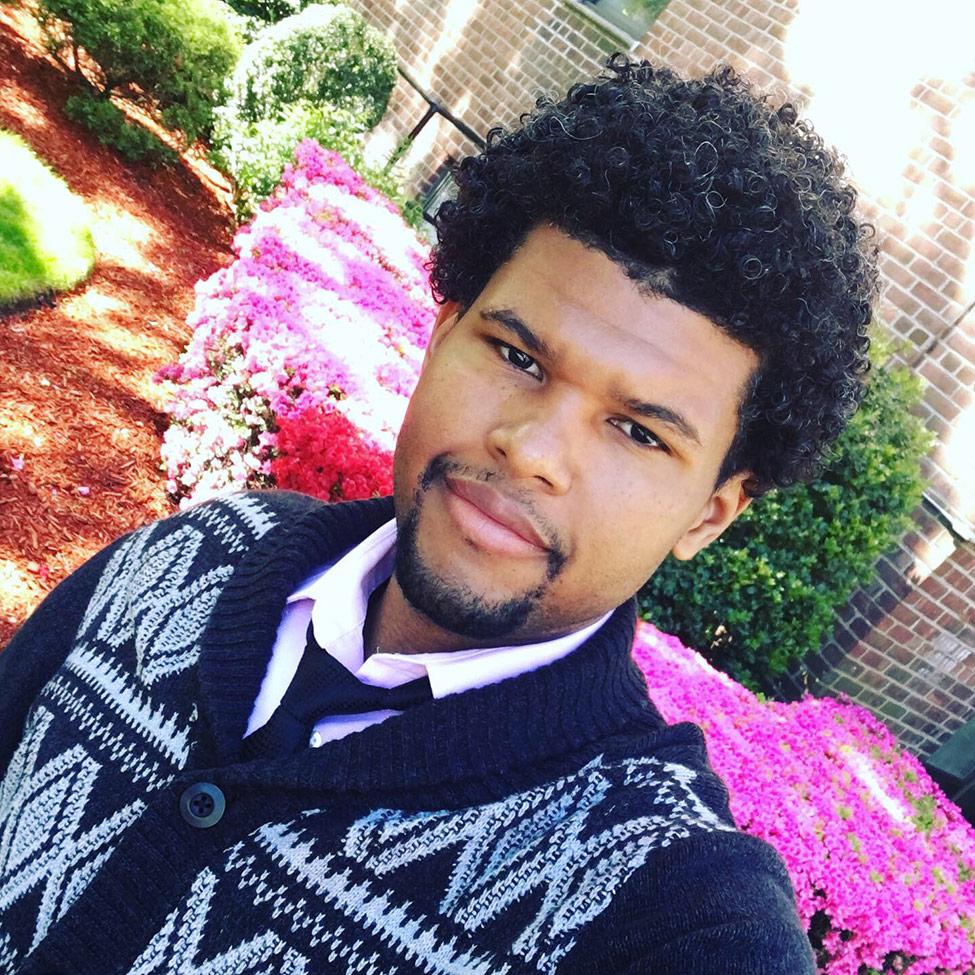
The project centered around the critical reading of three cross-disciplinary pieces of literature. The first was the Pulitzer Prize winner The Brief Wondrous Life of Oscar Wao by Junot Diaz, a fictional story of a young Dominican boy living in New Jersey who dreams of becoming the Dominican J.R.R. Tolkien.
“I felt that this book was going to be an easy read for Lulu,” said Fernández, “because if you’re a Dominican living in the diaspora and you happen to go to school, there is no way that you’re not going to find yourself immersed in this character.”
The next piece was more challenging: French Marxist Louis Althusser’s essay, “Ideology and Ideological State Apparatuses.” In it, Althusser argues that social institutions such as school, the church, and family have the capacity, through seemingly compulsory, albeit unconscious, rituals and customs, to promote a worldview of bourgeois domination.
“As a math student, reading this kind of essay was a very new thing for me,” said Moquete. “I just started taking it slowly and rewriting it in a way I could understand. I realized then that I was analyzing it like a data scientist would analyze quantitative data. This was me analyzing qualitative data.”
Moquete’s final reading was Black Skin, White Masks, a 1952 book by the French-Martinican psychiatrist and philosopher Frantz Fanon. Having served in the French Army and having experienced several hurdles as a Black medical student, Fanon’s doctoral thesis was rejected, as the faculty deemed it was not valuable to the field. After graduating medical school and solidifying his theories with the empirical evidence of his practice, he published his work. The book lays out a human-scientific approach to how colonialism imposes, defines, and replicates the psychology of the colonized. The book also engages in a systemic analysis and provides a historical critique of the effects of colonialism on the human psyche.
“It became very clear to me that, because she does not mainly study the humanities, Lulu needed very specific examples to connect to,” said Fernández of selecting Fanon’s work. “This book is more of a sociological, scientific analysis, so I thought this was the most applied theoretical framework that Lulu could utilize to begin to make sense of all of these texts.”
Their emphasis in employing these three vastly different texts was to contextualize both qualitative and quantitative data on the effects of colonialism. Fernández mentioned that the statistician and the sociologist often work separately—the statistician supplies the numbers, and the sociologist contextualizes them. His hope is for his students, in this case particularly Moquete, to understand the connection from both sides.
The Outcomes
This fall, Moquete presented her work to members of the Pace community at an event hosted by the Center for Undergraduate Research Experiences for students who participated in summer research programs. Fernández noted his pride in Moquete’s presentation, particularly in her ability to speak eloquently and analytically about information outside of her declared discipline, mathematics.
Moquete and Fernández have laid the groundwork for the course they hope will one day become a staple of social analyses at Pace, noting that conversations have begun to add their course to the academic catalog, a legacy that Moquete can leave at Pace even after she’s crossed the stage in May.
“I really hope that once this course is created, it can influence many other minoritized students to get involved in programs and departments like this,” said Moquete. “You don’t usually see a lot of minoritized students in a math program, but I hope that in the future, more will know that they’re capable of being in programs like this.”
And as for her post-grad plans, her work with Fernández did, in fact, provide her with clarity on her next step: she plans to pursue a PhD in applied mathematics or data science.
“Having this mathematical background has helped me think more eloquently in a lot of different fields,” Moquete said. “So, imagine having a higher degree in that, how many more windows it would open for me to be able to see the world in a different way.”
Above all, Moquete will graduate with a life-changing connection with Fernández.
“The one topic that Lulu and I have never discussed in our hundreds of hours in my office or via email is math,” Fernández said with a laugh.
“I'm really glad that I've had a mentor like Professor Fernández, especially within the department,” said Moquete, “to help guide me through this experience of college and extend myself in ways I didn't know I could.”
Dyson Digital Digest: Winter 2024
In the Dyson College of Arts and Sciences, hands-on learning isn’t reserved solely for the science labs and art studios. Pace’s experiential approach to the humanities builds on the University’s long-standing commitment to undergraduate research and civic engagement.
Dyson faculty members Matthew Bolton, PhD, and Emily Welty, PhD, are at the forefront of nuclear disarmament advocacy on a local and global scale. As the founders of the Pace Disarmament Institute, they welcome the many students who express interest in their work to get involved through internships, activism, and speaking opportunities.
Dyson alumna Juliana Martins ’19 is a Forbes 30 Under 30 entrepreneur whose success is built on communications and business skills developed at Pace.
Days After Being Hit With An $83 Million Judgment, Trump Faces A ‘Financial Death Sentence’
“Ordering the dissolution of a business for financial fraud is an extraordinary remedy, some people even claiming it to be akin to the death penalty,” Bennett Gershman, a former New York prosecutor and law professor at Pace University, told Salon. “Dissolution, or liquidation, hardly ever happens, especially when there is no proof that victims were harmed or financial institutions lost money.”
Journey Illustrated: A Comic Arts Exhibition
Pace University Art Gallery is pleased to present Journey Illustrated, a comic arts exhibition curated by Prof. Tommy Nguyen and Anna Zhang ’24. The exhibit opens with a reception on Tuesday, February 13 from 5:00 p.m.–7:00 p.m.
40 Accredited Online Business Degree Programs Heading Into 2024
Among 40 accredited online business degree programs, Insider Monkey places Pace at the 21st spot.
The Best Nurse Practitioner Programs in New York Rankings Summary
The NurseJournal ranks Pace University as the seventh best nurse practitioner program in New York for 2024.
Westchester Parks Foundation Elects 2 New Members To Board Of Directors
News 12 reports Professor Shelby Green was elected as a new member to the Westchester Parks Foundation Board of Directors.
Richard Shadick On WHYY - The Impact Social Media Has On Students
Richard Shadick, who directs the counseling center at Pace University in New York City says things only got worse with the advent of smartphones that it became a real problem. And I think one of the interesting things is a vote for Mo was coined before social media, it became a very popular turn because of social media. That led to the students spending a lot of time online in 2009.
